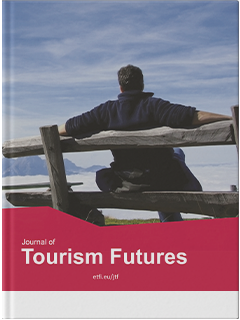Understanding mobile augmented reality apps in Pakistan: an extended mobile technology acceptance model
IF 5.8
Q1 HOSPITALITY, LEISURE, SPORT & TOURISM
引用次数: 0
Abstract
PurposeAugmented reality (AR) adoption has boomed globally in recent years. The prospective of AR to seamlessly integrate digital information into the actual environment has proven to be a challenge for academics and industry, as they endeavor to understand and predict the influence on users' perceptions, adoption intentions and usage. This study investigates the factors affecting consumers’ behavioral intention to adopt AR technology in shopping malls by offering the mobile technology acceptance model (MTAM).Design/methodology/approachThis conceptual framework is based on mobile self-efficacy, rewards, social influence and enjoyment of existing MTAM constructs. A self-administered questionnaire, constructed by measuring questions modified from previous research, elicited 311 usable responses from mobile respondents who had recently used AR technology in shopping malls. This analysis was performed using SmartPLS3.0.FindingsGrounded on the findings of the study, it was found that, aside from factors such as mobile usefulness, ease of use and social influence, the remaining independent variables had the most significant impact on adopting AR technologies. Considering the limitations of this study, the paper concludes by discussing the significant implications and insinuating avenues for future research.Originality/valueTo better investigate mobile AR app adoption in Pakistan’s shopping malls, the researchers modified the newly proposed MTAM model by incorporating mobile self-efficacy theory, social influence, rewards and perceived enjoyment. However, the extended model has not been extensively studied in previous research. This study is the first to examine the variables that affect an individual’s intention to accept mobile AR apps by using a novel extended MTAM.了解巴基斯坦的移动增强现实应用:扩展的移动技术接受模型
目的近年来,增强现实(AR)的应用在全球范围内蓬勃发展。事实证明,AR 将数字信息无缝集成到实际环境中的前景是学术界和产业界面临的一项挑战,因为他们正努力了解和预测其对用户认知、采用意向和使用的影响。本研究通过提供移动技术接受模型(MTAM)来调查影响消费者在商场中采用 AR 技术的行为意向的因素。设计/方法/途径本概念框架基于现有 MTAM 构建的移动自我效能、奖励、社会影响和享受。从最近在购物中心使用过 AR 技术的移动受访者那里,通过测量根据以往研究修改过的问题而制作的自填式问卷,获得了 311 份可用回复。根据研究结果发现,除了移动实用性、易用性和社会影响等因素外,其余自变量对采用 AR 技术的影响最为显著。考虑到本研究的局限性,本文最后讨论了本研究的重要意义,并提出了未来的研究方向。 原创性/价值为了更好地研究巴基斯坦购物中心对移动 AR 应用的采用情况,研究人员修改了新提出的 MTAM 模型,将移动自我效能理论、社会影响、奖励和感知乐趣纳入其中。然而,以往的研究并未对扩展模型进行广泛研究。本研究首次使用新颖的扩展 MTAM 模型研究了影响个人接受移动 AR 应用意向的变量。
本文章由计算机程序翻译,如有差异,请以英文原文为准。
求助全文
约1分钟内获得全文
求助全文
来源期刊

Journal of Tourism Futures
HOSPITALITY, LEISURE, SPORT & TOURISM-
CiteScore
15.70
自引率
6.00%
发文量
64
审稿时长
34 weeks
期刊介绍:
 求助内容:
求助内容: 应助结果提醒方式:
应助结果提醒方式:


